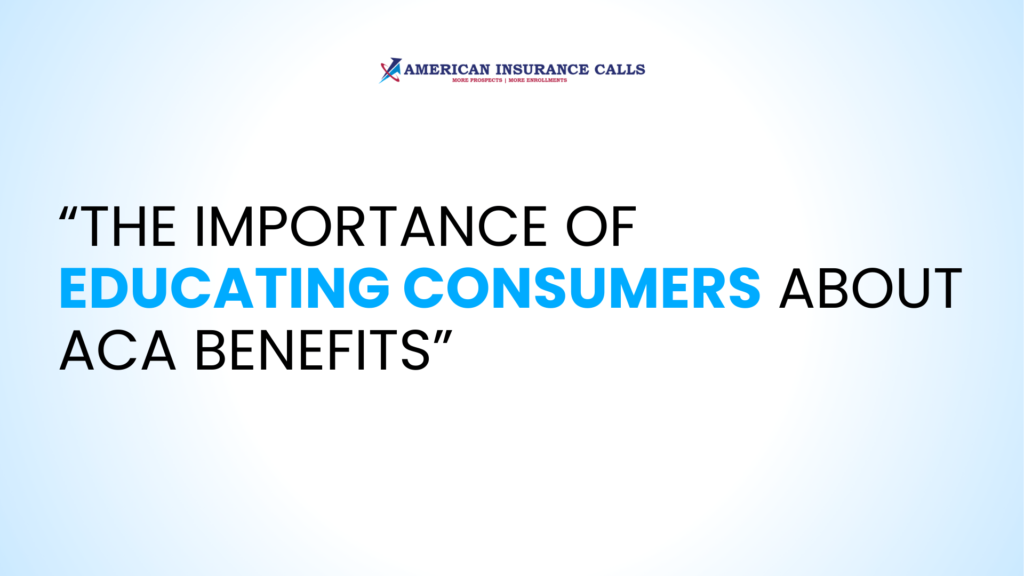The Affordable Care Act (ACA) has revolutionized healthcare in the United States, providing millions of individuals and families with access to affordable health insurance. Despite its impact, many consumers remain unaware of the full range of benefits ACA plans offer or are unsure how to navigate the enrollment process. For insurance agents and healthcare professionals, educating consumers about ACA benefits is critical to helping them make informed decisions, improving their access to healthcare, and reducing financial barriers.
This article explores the importance of educating consumers about ACA benefits, common misconceptions, and strategies for effectively communicating key information.
Why Educating Consumers About ACA Benefits is Essential
1. Many Consumers Are Unaware of ACA Options
While the ACA has been in place for over a decade, research shows that a significant portion of the population remains uninformed about its benefits, such as:
- Subsidies that reduce premiums and out-of-pocket costs.
- Coverage for essential health benefits.
- Protections for pre-existing conditions.
Education ensures that consumers understand these advantages and take full advantage of what ACA plans offer.
2. Helps Consumers Make Informed Decisions
Navigating health insurance can be overwhelming, especially for first-time buyers. By educating consumers, you empower them to:
- Compare plan options effectively.
- Choose coverage that meets their healthcare needs and budget.
- Understand the implications of their decisions, such as network access and cost-sharing requirements.
3. Reduces Barriers to Accessing Healthcare
Lack of understanding about ACA benefits can lead to missed opportunities for coverage. For example:
- Consumers may assume they don’t qualify for subsidies and avoid exploring ACA plans.
- They may not realize that preventive care is covered without additional costs. Educating consumers removes these barriers and encourages them to seek the coverage they need.
4. Builds Trust and Credibility
Providing accurate and transparent information about ACA benefits establishes you as a trusted advisor. This trust fosters long-term relationships and increases the likelihood of client referrals.
5. Encourages Healthier Communities
When consumers understand their ACA benefits, they’re more likely to use preventive services, manage chronic conditions, and seek timely care. This leads to better health outcomes and stronger communities.
Key ACA Benefits to Highlight
1. Affordability Through Subsidies
One of the ACA’s most significant benefits is the availability of subsidies to reduce premiums and out-of-pocket costs:
- Premium Tax Credits: Lower the cost of monthly premiums based on income and household size.
- Cost-Sharing Reductions: Reduce deductibles, copayments, and coinsurance for eligible individuals.
Educate consumers about how to determine their eligibility and the financial assistance available.
2. Coverage for Essential Health Benefits
ACA plans cover 10 essential health benefits, including:
- Doctor visits and hospital stays.
- Prescription drugs.
- Preventive care, such as vaccines and screenings.
- Mental health services.
- Maternity and newborn care.
- Pediatric services.
Highlighting these benefits helps consumers see the value in ACA coverage.
3. Protections for Pre-Existing Conditions
The ACA prohibits insurance companies from denying coverage or charging higher premiums based on pre-existing conditions. This benefit is especially important for individuals with chronic illnesses or ongoing healthcare needs.
4. Preventive Care at No Extra Cost
Educate consumers about the range of preventive services covered under ACA plans without additional out-of-pocket costs, such as:
- Annual check-ups.
- Cancer screenings.
- Immunizations.
These services encourage proactive health management and reduce long-term healthcare expenses.
5. Access to Medicaid Expansion
In states that have expanded Medicaid under the ACA, low-income individuals and families may qualify for free or low-cost health insurance. Ensure consumers in these states are aware of this option.
Common Misconceptions About ACA Benefits
1. “ACA Plans Are Too Expensive”
Many consumers are unaware of the subsidies that make ACA plans affordable. Educating them about financial assistance options can dispel this misconception.
2. “I Don’t Qualify for ACA Coverage”
Some individuals believe they’re ineligible due to income, employment status, or other factors. Clarify that ACA plans are available to most Americans, regardless of these variables.
3. “ACA Plans Don’t Cover My Needs”
Consumers may not realize the comprehensive nature of ACA plans. Highlighting the essential health benefits ensures they understand the scope of coverage.
Strategies for Educating Consumers About ACA Benefits
1. Simplify Complex Information
Health insurance terminology can be intimidating. Use plain language to explain key concepts, such as:
- Premiums vs. deductibles.
- The role of subsidies in reducing costs.
- Differences between plan tiers (Bronze, Silver, Gold, Platinum).
2. Leverage Digital Tools
Digital platforms are a powerful way to educate a broad audience. Consider:
- Webinars: Host virtual sessions to explain ACA benefits and answer questions.
- Infographics: Create visually engaging graphics that break down ACA coverage.
- Videos: Post short, informative videos on social media platforms like Facebook and YouTube.
3. Offer Personalized Guidance
Every consumer’s needs are different. Tailor your advice by:
- Asking about their health priorities, such as managing chronic conditions or accessing specialists.
- Providing plan comparisons based on their budget and healthcare needs.
- Explaining how ACA benefits align with their unique situation.
4. Host Community Workshops
In-person workshops are an excellent way to connect with local communities. Topics could include:
- “Understanding ACA Subsidies.”
- “How to Enroll in an ACA Plan.”
- “Maximizing Your ACA Benefits.”
5. Provide Clear Enrollment Guidance
Many consumers miss out on ACA coverage due to confusion about enrollment deadlines and processes. Educate them about:
- Open Enrollment Period (OEP): The annual window to sign up for coverage.
- Special Enrollment Periods (SEPs): Triggered by qualifying life events, such as marriage or job loss.
6. Collaborate with Local Organizations
Partner with community centers, senior groups, or nonprofits to reach underserved populations. Providing education through trusted local organizations enhances your credibility.
Benefits of Educating Consumers About ACA Benefits
1. Empowered Decision-Making
Educated consumers are better equipped to choose plans that meet their healthcare needs and budget.
2. Improved Client Relationships
Providing clear and helpful information builds trust, resulting in long-term client loyalty.
3. Increased Enrollment Rates
When consumers understand the value of ACA benefits, they’re more likely to enroll, boosting your success as an insurance agent.
4. Healthier Communities
Informed consumers are more likely to access preventive care and manage their health effectively, contributing to overall community well-being.
Conclusion
Educating consumers about ACA benefits is not only a key responsibility for insurance agents but also a critical step in helping individuals and families access affordable, comprehensive healthcare. By simplifying complex information, dispelling misconceptions, and offering personalized guidance, you can empower consumers to make informed decisions and improve their quality of life.
Start implementing these strategies today to become a trusted resource in your community and make a meaningful impact on the lives of your clients.

